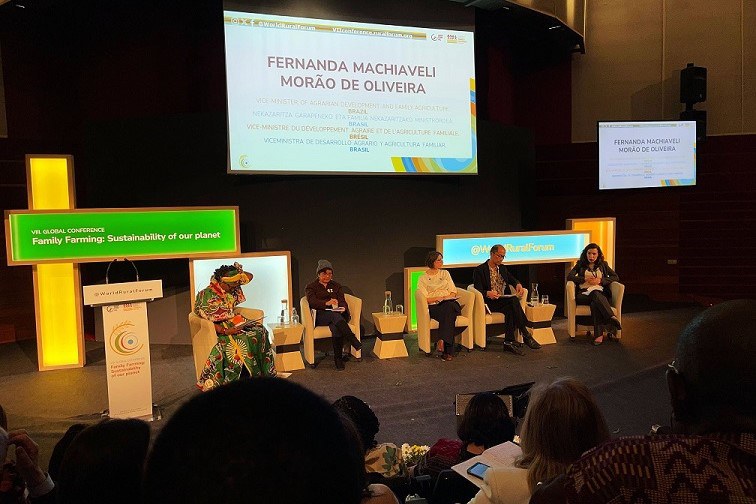Notícias
FAMILY FARMING IN THE WORLD
Policies to strengthen Brazilian family farming highlighted in Spain

.
Representatives from various countries and rural organizations are meeting in the north of Spain, in Victoria-Gasteiz, to debate the fundamental role of family farming for the sustainability of the planet. As world reference in public policies for the sector, Brazil was highlighted with the participation of the Ministry of Agrarian Development and Family Farming (MDA) at the event.
Representing Minister Paulo Teixeira, the Executive Secretary of the MDA, Fernanda Machiaveli, debated two important panels on Thursday (21).
In the first panel, entitled "The role of family farming organizations in response to climate change", Machiaveli said that there is no way to dissociate the achievement of global international carbon emission targets in Brazil from a process of transforming food systems to strengthen family farming. "We need to encourage adaptation policies for a condition in which climatic events increasingly impact on our productive capacity, as well as policies to mitigate these events, such as strengthening sustainable, regenerative and, especially, agroecological agriculture," she warned.
She went on to mention the MDA's public policies that are moving in this direction, such as new measures to encourage agroecological transition and organic production in the Family Farming Harvest Plan 2023/2024, the Dom Hélder Câmara Project, agricultural insurance, the Harvest-Guarantee, among others.
Chaired by Cécile B. Ndjebet, president of the Network of African Women for Community Forest Management (REFACOF), the panel also included Esther Penunia, secretary-general of the Asian Farmers Association (AFA); FAO climate change expert Giulia Galbiati, and the coordinator of the International Agroecology Coalition, Oliver Oliveros.
During the second session, at the High-Level Meeting, about the commitment to family farming to lead the 2030 Agenda, the MDA representative stressed that the current challenges are even greater than those of the past. "As well as fighting hunger, we need to deal with climate change, which is becoming increasingly severe," she said.
Machiaveli also pointed out the Brazilian government's priorities in the presidency of the G20 in 2024, which are the fight against hunger, poverty and inequality, sustainable development and the reform of global governance. He added that Brazil wants to fight hunger with quality food and that this will only be possible by strengthening family production and advancing agrarian reform.
She also highlighted the importance of rural women playing a leading role in this process, citing the MDA's public policies for them, such as the Productive Backyards, a program created in response to the demands of the “Marcha das Margaridas”.
The executive secretary announced an important new Brazilian initiative that meets those objectives: the change in the basic food basket, with the removal of ultra-processed products and the inclusion of various agro-ecological and family farming foods. "We made a commitment here to bring this debate to the G20 and also to strengthen policies for rural women, rural youth, and this whole debate which is so important in driving the 2030 Agenda to fight hunger at the same time as we produce more and more with sustainability and respect for the environment," she added.
The MDA secretary discussed these topics alongside Gabriel Ferrero, Spanish ambassador for food security; Minoru Nishi, president of the Pacific Islands Farmers' Organizations Network (Pifon); Leonard Mizzi, head of the European Commission's Sustainable Agri-Food and Fisheries Systems Unit; and Rossana Carolina Ayala, deputy minister of Family Farming in Paraguay. The panel was moderated by Alexina Cathar, a journalist from the Food Tank Organization.
About the event
The 8th Global Conference on Family Farming, organized by the World Rural Forum, is taking place in the northern Spanish city of Victoria-Gasteiz. This year's theme is "Family Farming: sustainability of our planet".
Representatives of social organizations and countries such as Brazil, Paraguay, Uruguay, Germany, Spain, the African Union, the Dominican Republic, Madagascar and the Philippines are taking part.